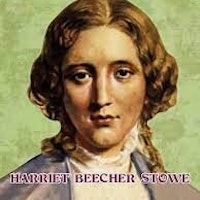Of Mary Magdalene it is recorded that ‘she loved much.’ And the love that is strongest is often that which has suffered most.
Of Mary Magdalene it is recorded that ‘she loved much.’ And the love that is strongest is often that which has suffered most.
Harriet Beecher Stowe

She Loved Much
Topic: Love, Compassion, & Kindness
Of Mary Magdalene it is recorded that ‘she loved much.’ And the love that is strongest is often that which has suffered most. She it was that stood without at the sepulchre weeping… and to her, first of all, the risen Christ revealed Himself.
Harriet Elisabeth Beecher Stowe was born on June 14, 1811, in Litchfield, Connecticut, United States, into the influential and devout Beecher family. She was the sixth of eleven children born to Reverend Lyman Beecher and Roxana Foote Beecher. After her mother’s early death, Harriet studied at the Hartford Female Seminary, founded by her sister Catharine Beecher. In 1832, she moved to Cincinnati, Ohio, where her father led Lane Theological Seminary. There, she encountered both literary society and the harsh realities of slavery through the stories of escaped enslaved people and the violence of anti-Black riots.
In 1836, Harriet married Calvin Ellis Stowe, a professor of biblical literature, and they had seven children. The Fugitive Slave Act of 1850 prompted her to begin writing Uncle Tom’s Cabin, which was serialized in The National Era in 1851 and published as a book in 1852. The novel gained a wide readership and deepened anti-slavery sentiment in the North and abroad. Stowe said she was inspired by a vision during a communion service and also drew from personal loss—especially the death of her young son—which shaped her empathy for those suffering under slavery.
Over her life, Harriet Beecher Stowe published more than thirty books, including novels, essays, and travel memoirs. She later supported married women’s legal rights and helped found the Hartford Art School. After her husband’s death in 1886, her health declined, and she likely experienced dementia. She died on July 1, 1896, in Hartford, Connecticut, at age 85. Stowe is remembered as a writer who brought moral clarity to public debate, guided by her religious convictions and social conscience.
Stowe, Harriet Beecher. Woman in Sacred History: A Series of Sketches Drawn from Scriptural, Historical, and Legendary Sources. J.B. Ford and Co., 1873, pp. 177–179.

Harriet Beecher Stowe
Theme: Love

About This Harriet Beecher Stowe Quotation [Commentary]
Harriet Beecher Stowe’s reflection on Mary Magdalene centers on love shaped through sorrow. In the line, “she loved much,” Stowe emphasizes not sentiment, but depth of devotion. “The love that is strongest is often that which has suffered most,” she writes, connecting Mary’s steadfastness to the pain she endured. Mary “stood without at the sepulchre weeping,” and it is in this place of loss that love remains present. For Stowe, this is not weakness—it is strength. Mary’s suffering becomes the ground for spiritual recognition.
Harriet Beecher Stowe draws attention to the moment when “to her, first of all, the risen Christ revealed Himself.” Mary’s presence at the tomb, in grief and in love, is not secondary to the story—it is central. She does not flee from sorrow but remains close, and in that staying, something is revealed. Stowe names this clearly: “the victory of the spiritual was most complete” in her. The revelation does not come in spite of sorrow, but through it.
In Woman in Sacred History, Harriet Beecher Stowe presents Mary Magdalene not as a figure of speculation but as “one of a band of women who ministered to Jesus, and followed him in his journeys.” Her presence is active and faithful. Love, for Stowe, is not only feeling but endurance—the kind that remains through death and stays near the unseen. That Mary loved much is not just remembered; it becomes the frame through which she is first to See.
Additional Harriet Beecher Stowe Quotations
Harriet Beecher Stowe’s Moral Vision
Harriet Beecher Stowe’s moral vision was deeply shaped by her Christian faith—especially her belief in the teachings of Christ, the dignity of every human soul, and the redemptive power of love and sacrifice. Her abolitionism, views on domestic service, and ideals of womanhood were all framed within a Christian moral and theological lens. She once wrote, “I did not write it. God wrote it. I merely did his dictation,” when describing Uncle Tom’s Cabin—a clear sign of her understanding of her work as a Christian vocation.
Related Quotes
Copyright © 2017 – 2026 LuminaryQuotes.com About Us